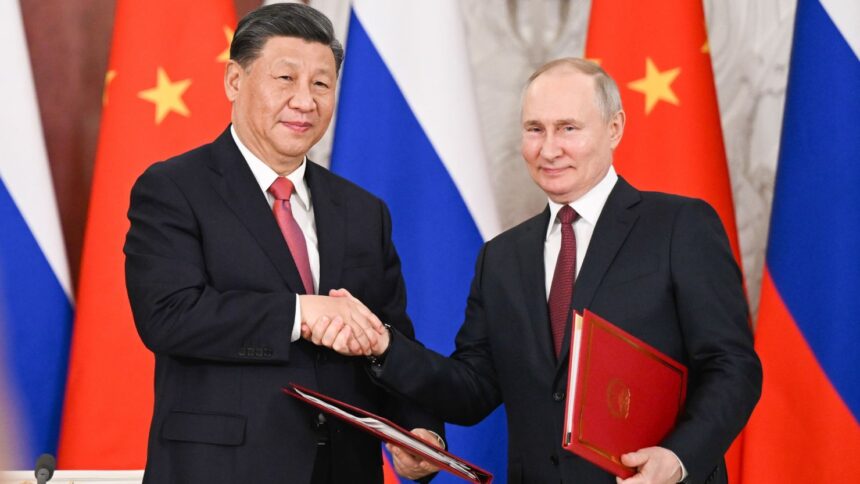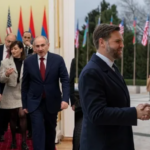Summary by Geopolist | Istanbul Center for Geopolitics:
The China-Russia relationship is presented as the most significant challenge to U.S. interests in decades in this report, This quasi-alliance is not founded on shared ideology, but rather on mutual grievances against the United States and its global influence. The objective of their collaborative endeavour is to alter the international order and reduce the influence of the United States.
Historical Context:
- The current state of profound collaboration between China and the Soviet Union has replaced the conflicts of the past.
- Joint military exercises and diplomatic vetoes at the United Nations are noteworthy milestones.
China’s Perspective on the Relationship
China’s View of the Relationship
- A strategic rear that offers stability during periods of instability.
- A partner that contributes to the economic growth of Beijing by providing energy and discounted products.
- A supporter of international forums that are opposed to U.S.-led policies.
However, China harbours reservations about:
- The erratic risk tolerance of Russia, as evidenced by the Ukraine crisis.
- The potential for a Western reprisal in response to Russian actions.
- A potential regime transition in Russia that could align Moscow with the West.
Russia’s Perspective on the Relationship
Russia’s View of the Relationship
- A critical economic lifeline in the face of Western sanctions.
- A provider of political support, diplomatic protection, and technology.
- A critical ally in the fight against the Western hegemony.
- Russia recognizes the power imbalance and its increasing dependence on China; however, it places a higher value on the strategic advantages of the partnership.
Collaboration to Undermine the West
Diplomatic Cooperation:
- Since 2007, China and Russia have vetoed 16 resolutions at the United Nations, preventing action on issues such as Syria, Myanmar, Venezuela, and North Korea.
- They advocate for multipolarity and reduced dollar reliance by utilizing institutions such as the SCO and BRICS to propagate an anti-Western narrative.
Military Cooperation:
- The scale and intricacy of joint exercises have increased, with scenarios such as island-seizing operations that mirror Taiwan contingencies.
- In 2024, their military partnership expanded to include unprecedented incursions into U.S. air defence zones and Arctic expeditions.
Economic Cooperation:
- There has been a significant increase in trade between the two countries, with China emerging as Russia’s primary trading partner.
- China has secured discounted hydrocarbons to enhance its energy security, while Russia’s dependence on China for energy exports and essential products has increased.
- The dollar’s dominance is being undermined by both countries through the expansion of yuan-based transactions.
Shared Strategic Objectives: - Substitute the United States as the preeminent global power.
- Undermine the extended deterrence and alliances of the United States.
- Prioritize authoritarian governance models over democratic norms.
- Establish a multipolar global order that prioritizes their respective regional spheres of influence.
Partnership Obstacles - The relationship is not entirely harmonious, despite its profound cooperation.
Challenges in the Partnership:
- Power Asymmetry: The potential for subordination exists as Russia’s economic and political dependence on China increases.
- Competition in Central Asia and the Arctic may potentially impair relationships.
- Policy Disparities: China prioritizes stability, whereas Russia pursues disruptive initiatives (e.g., in Ukraine).
The shared opposition to the U.S. binds them closely, overshadowing tactical disagreements, despite these challenges.
Policy Recommendations for the U.S.
The report delineates a multifaceted approach to counteract the China-Russia partnership:
Strengthen Alliances:
- Strengthen partnerships with NATO, Quad, AUKUS, and other security frameworks.
- Develop alliances with “swing states” such as Turkey, Brazil, and India.
Increase Investments in Strength:
- Increase defence expenditure to surpass the current 3% of GDP.
- Invest in foreign aid, resilient supply chains, and sophisticated technologies to mitigate the influence of China and Russia.
Focus on Immediate Threats:
- While preparing for a long-term confrontation with China in the Indo-Pacific, prioritize the containment of Russia’s aggression in Europe.
Offset the “Axis of Upheaval”:
- Through targeted sanctions, partnerships, and deterrence measures, combat the increasing collaboration between China, Russia, Iran, and North Korea.
Reject Simplistic Strategies:
- Refrain from attempting to create a wedge between China and Russia, as their shared grievances against the United States outweigh their differences.
Leverage Temporal Asymmetries:
- Take advantage of the fact that Russia’s actions are immediate and aggressive, while China’s strategy is gradual. Russia’s capacity to provide assistance to China in the future will be reduced as a result of its current vulnerability.
Final assessment: - The China-Russia partnership is a generational challenge for U.S. policymakers, with profound implications for global stability. The report concludes that addressing this threat requires unity among U.S. allies, substantial investments in defense and innovation, and a strategic focus on countering the duo’s combined influence in critical regions.
Main Points
Strategic Threat: The China-Russia quasi-alliance is confronting U.S. global leadership by reshaping the international landscape.
Policy Response: The United States must concurrently bolster domestic resilience and leverage alliances to deter Chinese ambitions and contain Russian aggression.
Enduring Rivalry: The partnership is expected to endure, despite the inherent tensions, as a result of shared opposition to U.S. policies and norms.
Read the full report here.







